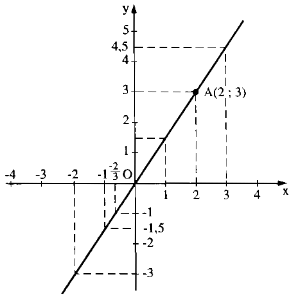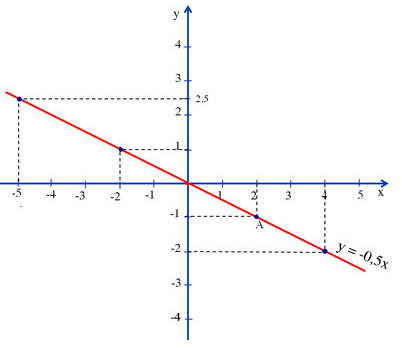Hãy nhập câu hỏi của bạn vào đây, nếu là tài khoản VIP, bạn sẽ được ưu tiên trả lời.

Cho x =2 được y =-2 =>A(2 ;-1) thuộc đồ thị. Vẽ đồ thị
a) Trên đồ thị ta thấy
f(2)=-1
f(-2) =1
f(4)=-2
f(0)=0;
b) Trên đồ thị ta thấy
y=-1 => x=2
y=0 => x=0
y=2,5 => x=-5
c) Khi y dương y > 0 ứng với phần đồ thị nằm trên trục hoành và bên trái trục tung nên x < 0.
Khi y âm : y < 0 ứng với phần đồ thị nằm trên trục hoành và bên phải trục tung nên x > 0

Đồ thị hàm số đi qua O (0; 0)
Cho x = 2 ⇒ y = 1,5. 2 = 3
Ta có: A(2; 3)
Vẽ đường thẳng OA ta có đồ thị hàm số.

a) f(1) = 1,5. 1 = 1,5
f(-1) = 1,5. (-1) = -1,5
f(-2) = 1,5. (-2) = -3
f(2) = 1,5. 2 = 3
f(0) =0
b)\(y=-1\Rightarrow x=\dfrac{-1}{1,5}=-\dfrac{2}{3}\)
\(y=0\Rightarrow x=\dfrac{0}{1,5}=0\)
\(y=4,5\Rightarrow x=\dfrac{4,5}{1,5}=3\)
c) y > 0 ⇒1,5x > 0 ⇒x > 0
y < 0 ⇒ 1,5x < 0 ⇒ x < 0
Đồ thị hàm số đi qua O (0; 0)
Cho x = 2 ⇒⇒ y = 1,5. 2 = 3
Ta có: A(2; 3)
Vẽ đường thẳng OA ta có đồ thị hàm số.

a) f(1) = 1,5. 1 = 1,5
f(-1) = 1,5. (-1) = -1,5
f(-2) = 1,5. (-2) = -3
f(2) = 1,5. 2 = 3
f(0) = 0
b)y=−1⇒x=\(\dfrac{-1}{1,5}=-\dfrac{2}{3}\)
b)y=0⇒x==\(\dfrac{0}{1,5}=0\)
y=4,5⇒x=\(\dfrac{4,5}{1,5}=3\)
c) y > 0 ⇒1,5x > 0 ⇒x > 0
y < 0 ⇒ 1,5x < 0 ⇒ x < 0

mấy cái này đơn dãng vô cùng nhưng có đều bn ra đề dài quá nha
a) \(3x+4\ge7\Leftrightarrow3x\ge7-4\Leftrightarrow3x\ge3\Leftrightarrow x\ge1\) vậy \(x\ge1\)
b) \(-5x+1< 11\Leftrightarrow-5x< 11-1\Leftrightarrow-5x< 10\Leftrightarrow x>\dfrac{10}{-5}\)
\(\Leftrightarrow x>-2\) vậy \(x>-2\)
c) \(\dfrac{5}{x-3}< 0\Leftrightarrow x-3< 0\Leftrightarrow x< 3\) vậy \(x< 3\)
d) \(\dfrac{-7}{2-x}\ge0\Leftrightarrow2-x\le0\Leftrightarrow x\ge2\) vậy \(x\ge2\)
e) \(x^2+4x>0\Leftrightarrow x\left(x+4\right)>0\) \(\left\{{}\begin{matrix}\left[{}\begin{matrix}x>0\\x+4>0\end{matrix}\right.\\\left[{}\begin{matrix}x< 0\\x+4< 0\end{matrix}\right.\end{matrix}\right.\) \(\Leftrightarrow\left\{{}\begin{matrix}\left[{}\begin{matrix}x>0\\x>-4\end{matrix}\right.\\\left[{}\begin{matrix}x< 0\\x< -4\end{matrix}\right.\end{matrix}\right.\)
\(\Rightarrow\left\{{}\begin{matrix}x>0\\x< -4\end{matrix}\right.\) vậy \(x>0\) hoặc \(x< -4\)
f) \(\dfrac{x-2}{x-6}< 0\) \(\Leftrightarrow\left\{{}\begin{matrix}\left[{}\begin{matrix}x-2>0\\x-6>0\end{matrix}\right.\\\left[{}\begin{matrix}x-2< 0\\x-6< 0\end{matrix}\right.\end{matrix}\right.\) \(\Leftrightarrow\left\{{}\begin{matrix}\left[{}\begin{matrix}x>2\\x>6\end{matrix}\right.\\\left[{}\begin{matrix}x< 2\\x< 6\end{matrix}\right.\end{matrix}\right.\) \(\Rightarrow\left\{{}\begin{matrix}x>6\\x< 2\end{matrix}\right.\)
vậy \(x>6\) hoặc \(x< 2\)
g) \(\left(x-1\right)\left(x+2\right)\left(3-x\right)< 0\Leftrightarrow-\left[\left(x-1\right)\left(x+2\right)\left(x-3\right)\right]< 0\)
\(\Leftrightarrow\left(x-1\right)\left(x+2\right)\left(x-3\right)>0\)
th1: 3 số hạng đều dương : \(\Leftrightarrow\left[{}\begin{matrix}x-1>0\\x+2>0\\x-3>0\end{matrix}\right.\) \(\Leftrightarrow\left[{}\begin{matrix}x>1\\x>-2\\x>3\end{matrix}\right.\) \(\Rightarrow x>3\)
th2: 2 âm 1 dương : (vì trong 3 số hạng ta có : \(\left(x+2\right)\) lớn nhất \(\Rightarrow\left(x+2\right)\) dương)
\(\Leftrightarrow\left[{}\begin{matrix}x-1< 0\\x+2>0\\x-3< 0\end{matrix}\right.\) \(\Leftrightarrow\left[{}\begin{matrix}x< 1\\x>-2\\x< 3\end{matrix}\right.\) \(\Rightarrow-2< x< 1\)
vậy \(x>3\) hoặc \(-2< x< 1\)
h) \(\dfrac{x^2-1}{x}>0\) \(\Leftrightarrow\left\{{}\begin{matrix}\left[{}\begin{matrix}x^2-1>0\\x>0\end{matrix}\right.\\\left[{}\begin{matrix}x^2-1< 0\\x< 0\end{matrix}\right.\end{matrix}\right.\) \(\Leftrightarrow\left\{{}\begin{matrix}\left[{}\begin{matrix}x^2>1\\x>0\end{matrix}\right.\\\left[{}\begin{matrix}x^2< 1\\x< 0\end{matrix}\right.\end{matrix}\right.\)
\(\Leftrightarrow\left\{{}\begin{matrix}\left[{}\begin{matrix}\left\{{}\begin{matrix}x>1\\x< -1\end{matrix}\right.\\x>0\end{matrix}\right.\\\left[{}\begin{matrix}-1< x< 1\\x< 0\end{matrix}\right.\end{matrix}\right.\) \(\Rightarrow\left\{{}\begin{matrix}x>1\\-1< x< 0\end{matrix}\right.\) vậy \(x>1\) hoặc \(-1< x< 0\)
i) \(x^2+x-2< 0\Leftrightarrow x^2+x+\dfrac{1}{4}-\dfrac{9}{4}< 0\Leftrightarrow\left(x+\dfrac{1}{2}\right)^2-\dfrac{9}{4}< 0\)
\(\Leftrightarrow\left(x+\dfrac{1}{2}\right)^2< \dfrac{9}{4}\Leftrightarrow\dfrac{-3}{2}< \left(x+\dfrac{1}{2}\right)< \dfrac{3}{2}\Leftrightarrow-2< x< 1\)
vậy \(-2< x< 1\)
Mysterious Person, Đoàn Đức Hiếu, Nguyễn Đình Dũng , ... giúp mình!

a)\(x^2=0\\ \Leftrightarrow x=0\)
vậy...
b)\(x^2=1\\ \Rightarrow\left[{}\begin{matrix}x=1\\x=-1\end{matrix}\right.\)
vậy...
c)\(x^2=2\\ \Rightarrow x^2=\left(\pm\sqrt{2}\right)^2\\ \Rightarrow\left[{}\begin{matrix}x=\sqrt{2}\\x=-\sqrt{2}\end{matrix}\right.\)
vậy...
d)\(x^2=6\left(x>0\right)\\ \Rightarrow x^2=\left(\pm\sqrt{6}\right)^2\\ màx>0\\ \Rightarrow x=\sqrt{6}\)
vậy...
e)\(x^2=7\left(x< 0\right)\)
\(wtf\) ????? thông minh đấy \(x^2\ge0\) mà điều kiện lại là x < 0 ??? :D
rỗng r
f) \(\left(x+1\right)^2=1\\ \Rightarrow\left[{}\begin{matrix}x+1=1\\x+1=-1\end{matrix}\right.\Leftrightarrow\left[{}\begin{matrix}x=0\\x=-2\end{matrix}\right.\)
vậy....
g)\(\left(x-2\right)^2=2\\ \Rightarrow\left(x-2\right)^2=\left(\pm\sqrt{2}\right)^2\\ \Rightarrow\left[{}\begin{matrix}x-2=\sqrt{2}\\x-2=-\sqrt{2}\end{matrix}\right.\Leftrightarrow\left[{}\begin{matrix}x=\sqrt{2}+2\\x=-\sqrt{2}+2\end{matrix}\right.\)
tự tính :D
vậy..
h)\(\left(x+\sqrt{3}\right)^2=5\\ \Leftrightarrow\left(x+\sqrt{3}\right)^2=\left(\pm\sqrt{5}\right)^2\\ \Rightarrow\left[{}\begin{matrix}x+\sqrt{3}=\sqrt{5}\\x+\sqrt{3}=-\sqrt{5}\end{matrix}\right.\Leftrightarrow\left[{}\begin{matrix}x=\\x=\end{matrix}\right.\)
tự tính lười lắm

1)
a) x.x - 3 = 0
x^2 = 3
=> x = \(\sqrt{3}\)
b) x.x - 3 > 0
x^2 > 3
=> x > 2 và x < -2
c) x.x - 3 <0
x^2 < 3
mà x^2 luôn lớn hơn hoặc bằng 0
=> x^2 = 0; 1; 2
=> x = 0; \(\sqrt{1}\); \(\sqrt{2}\)

Để hàm số y = f (x) = -\(\dfrac{2}{3}\)x nhận giá trị dương thì x < 0

Để hàm số nhận giá trị âm thì x phải dương
nhận giá trị âm thì x phải dương
Chọn đáp án A